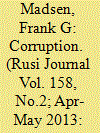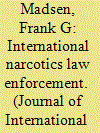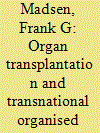| Srl | Item |
| 1 |
ID:
122241


|
|
|
|
|
| Publication |
2013.
|
| Summary/Abstract |
What is corruption and is it always harmful? These are the two key questions that Frank G Madsen assesses in his exploration of this public- and private-sector phenomenon. After surveying various academic and legal definitions, Madsen analyses corruption as a 'social bad', born of the inter-personal relationships within social groups, such as those involved in organised crime, and shaped by the structure and values of the society in which they operate. The article concludes by reviewing the range of international anti-corruption laws and measures currently in force before considering the role of governments in mitigating the domestic reach and impact of corruption.
|
|
|
|
|
|
|
|
|
|
|
|
|
|
|
|
| 2 |
ID:
117962


|
|
|
|
|
| Publication |
2012.
|
| Summary/Abstract |
This year sees the celebration of the first century of international legal provisions against the illicit production and trade of narcotics substances. Accordingly, this is an appropriate moment to evaluate the results obtained. The following essay considers how the international prohibition regime created the crime of drug trafficking. The ensuing function of denied demand is the inescapable basis for the development of organized crime. Second, costs of the regime are critically assessed. The former include institutional costs of law enforcement and of the incarceration of individuals sentenced for drug trafficking and related offences, e.g., violence and financial crimes. The indirect costs are difficult to gauge and impossible to monetize. They include the immense suffering caused by drug trafficking as well as the deterioration of public services due to corruption. The present situation on both sides of the U.S.-Mexico border is sufficiently eloquent evidence. Also, narcotics legislation leads to racial tension since the incarceration rates for non-whites for these offences is considerably higher than for whites in the United State and the United Kingdom. Third, political premises are briefly analyzed, namely the implementation of narcotics liaison offices in foreign jurisdictions and the linking of foreign aid and trade privileges to a certification of trade partners' adherence to U.S. antinarcotic drugs law enforcement. One might claim, somewhat counterintuitively, that decriminalization of drug trafficking is not necessary. Drug trafficking has already been decriminalized de facto, if not de jure, by the sheer, constant saturation of the market place.
|
|
|
|
|
|
|
|
|
|
|
|
|
|
|
|
| 3 |
ID:
126307


|
|
|
|
|
| Publication |
2013.
|
| Summary/Abstract |
Advancement in medical knowledge and lifestyle changes in contemporary society have led to an increasing demand for organs for transplantations, which supply cannot meet. This creates a new space for criminal activity in the illicit procurement and transplantation of human organs. Frank G Madsen surveys the many - ultimately unsuccessful - attempts to address the criminal trade in organs, and shows how current international and municipal legal frameworks fall short of providing an adequate way to conceptualise and eventually solve what is likely to be an increasingly pressing problem.
|
|
|
|
|
|
|
|
|
|
|
|
|
|
|
|